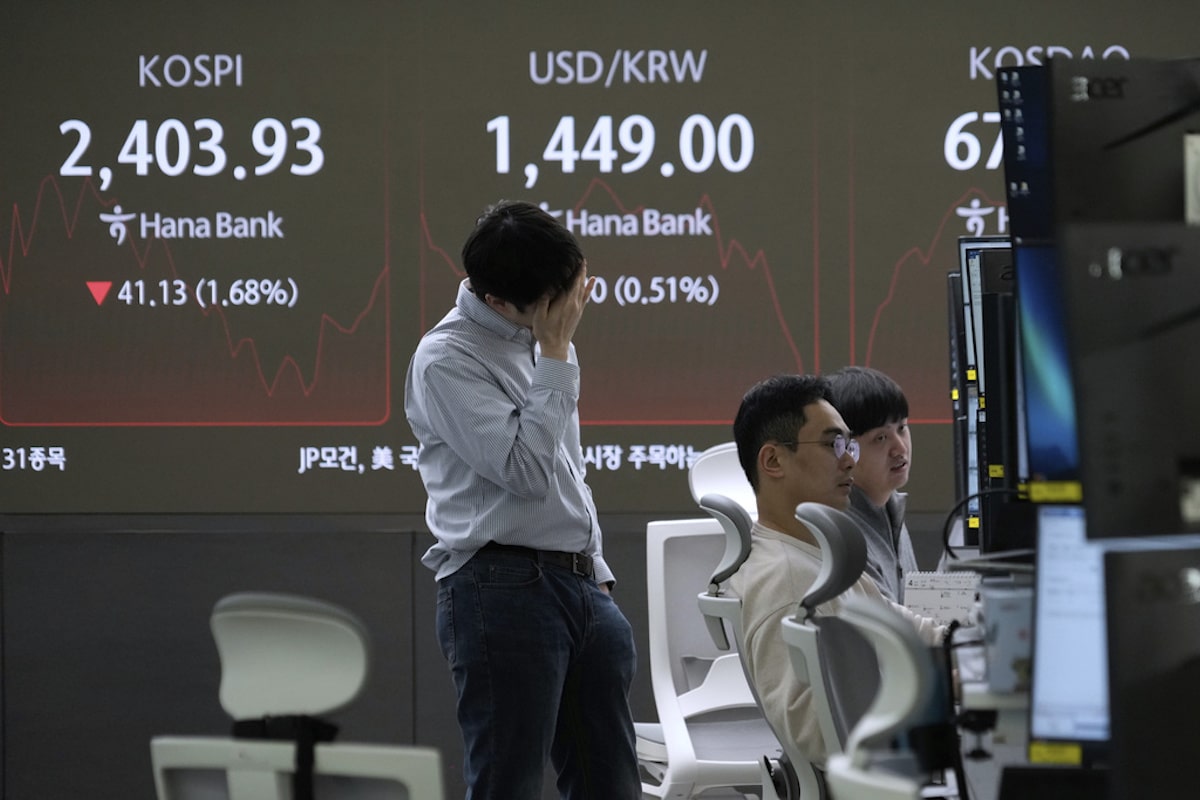Asian shares sink, with Japan’s Nikkei down 5.6 percent as China-US trade war escalates

A currency trader reacts near a screen showing the Korea Composite Stock Price Index (KOSPI), top left, and the foreign exchange rate between U.S. dollar and South Korean won at the foreign exchange dealing room of the KEB Hana Bank headquarters in Seoul, South Korea, Friday, April 11, 2025. (AP Photo/Ahn Young-joon)
BANGKOK — Asian shares sank Friday after US stocks gave up much of their historic gains from the day before.
The deepening worries over President Donald Trump’s trade war initially helped pull Japan’s Nikkei 225 share index down 5.6 percent.
By mid-morning in Tokyo, it was down 4.2 percent at 33,148.45.
The yen surged against the U.S. dollar, which also lost value against the euro.
One dollar bought 143.64 Japanese yen, down from about 146 yen a day earlier. The euro rose to $1.1306 from $1.1195.
South Korea’s Kospi fell 1.3 percent to 2,413.16, while in Australia, the S&P/ASX 200 shed 1.2 percent to 7,619.70.
In China markets, Hong Kong’s Hang Seng edged down 0.4 percent to 20,606.04 and Shanghai’s lost 0.2 percent to 3,218.94.
Taiwan’s Taiex gained 1.5 percent as investors expect more orders would transfer to Taiwan under the worsening China-US trade war.
China announced more countermeasures against the United States and losses for US stocks accelerated after the White House clarified that the United States will tax Chinese imports at 145 percent.
This was contrary to the 125 percent rate that Trump had written about in his posting on Truth Social Wednesday, once other previously announced tariffs were included.
The drop for the S&P 500 exceeded 6 percent at one point.
China, meanwhile, has been seeking to join forces with other countries in apparent hopes of forming a united front against Trump.
The world’s second-largest economy is also ramping up its own countermeasures to Trump’s tariffs.
A ploy, not a pivot
Investors are viewing Trump’s decision to delay higher tariffs for most countries for 90 days as a ploy, not a pivot, Stephen Innes of SPI Asset Management said in a commentary.
“That’s the market hitting the brakes, hard. The sugar high from Trump’s tariff pause is fading fast, and Asia’s about to feel the comedown. The champagne’s flat, the party’s over and the tape is twitching,” he wrote.
On Thursday, the S&P 500 tumbled 3.5 percent to 5,268.05, slicing into Wednesday’s surge of 9.5 percent following Trump’s decision to pause many of his tariffs worldwide.
The Dow Jones Industrial Average dropped 2.5 percent to 39,593.66, and the Nasdaq composite tumbled 4.3 percent to 16,387.31.
“Trump blinks,” UBS strategist Bhanu Baweja wrote in a report about the president’s decision on tariffs, “but the damage isn’t all undone.”
The stock price of Warner Bros. Discovery, the company behind “A Minecraft Movie,” dropped 12.5 percent for one of Wall Street’s sharpest losses.
This was after China said Thursday it will “appropriately reduce the number of imported U.S. films.” The Walt Disney Co.’s stock sank 6.8 percent
‘Wrong move’
A spokesperson for the China Film Administration said it is “inevitable” that Chinese audiences would find American films less palatable. That, given the “wrong move by the US to wantonly implement tariffs on China.”
That was after Trump and his Treasury Secretary, Scott Bessent, sent a clear message to other countries Wednesday after announcing their pause on tariffs for most countries: “Do not retaliate, and you will be rewarded.”
The European Union said Thursday it will put its trade retaliation measures on hold for 90 days and leave room for a negotiated solution.
Thursday’s swings also hit the bond market, which has historically played the role of enforcer against politicians and economic policies it deemed imprudent.
It helped topple the United Kingdom’s Liz Truss in 2022, for example, whose 49 days made her Britain’s shortest-serving prime minister.
Earlier this week, big jumps for U.S. Treasury yields had rattled the market, so much that Trump said Wednesday he had been watching how investors were “getting a little queasy.”
Several reasons could have been behind the sharp, sudden rise in yields. Hedge funds may have sold Treasurys in order to raise cash, and investors outside the United States may be dumping their US government bonds because of the trade war.